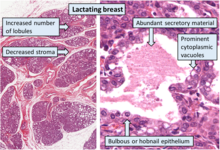| Breast engorgement | |
|---|---|
 | |
| Mature female breast engorged during nursing phase |

Breast engorgement occurs in the mammary glands due to expansion and pressure exerted by the synthesis and storage of breast milk. It is also a main factor in altering the ability of the infant to latch-on. Engorgement changes the shape and curvature of the nipple region by making the breast inflexible, flat, hard, and swollen. The nipples on an engorged breast are flat or inverted. Sometimes it may lead to striae on nipples, mainly a preceding symptom of septation mastitis.[1]
Engorgement usually happens when the breasts switch from colostrum to mature milk (often referred to as when the milk "comes in"). However, engorgement can also happen later if lactating women miss several nursings and not enough milk is expressed from the breasts. It can be exacerbated by insufficient breastfeeding and/or blocked milk ducts. When engorged the breasts may swell, throb, and cause mild to extreme pain.
Engorgement may lead to mastitis (inflammation of the breast) and untreated engorgement puts pressure on the milk ducts, often causing a plugged duct. The woman will often feel a lump in one part of the breast, and the skin in that area may be red and/or warm. If it continues unchecked, the plugged duct can become a breast infection, at which point she may have a fever or flu-like symptoms.
- ^ Santos, Kamila Juliana da Silva; Santana, Géssica Silva; Vieira, Tatiana de Oliveira; Santos, Carlos Antônio de Souza Teles; Giugliani, Elsa Regina Justo; Vieira, Graciete Oliveira (2016). "Prevalence and factors associated with cracked nipples in the first month postpartum". BMC Pregnancy and Childbirth. 16 (1): 209. doi:10.1186/s12884-016-0999-4. ISSN 1471-2393. PMC 4975913. PMID 27496088.